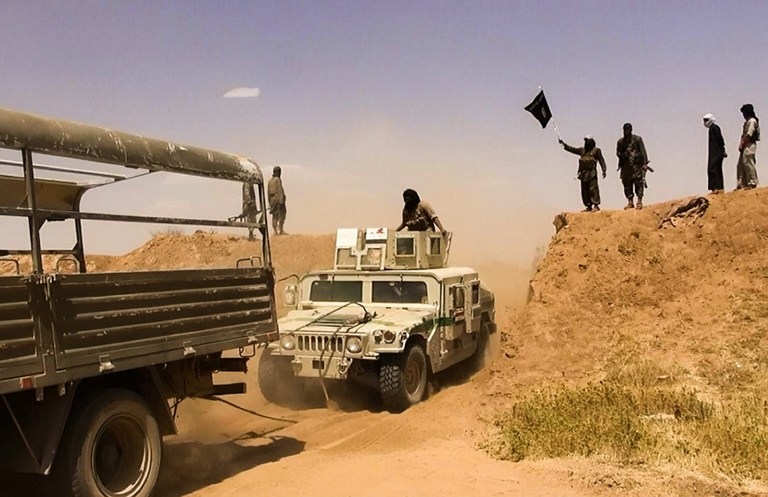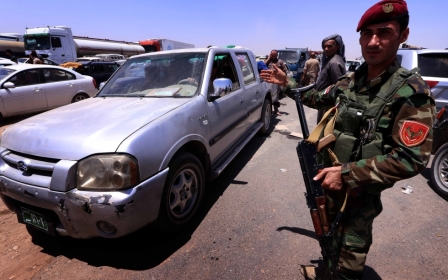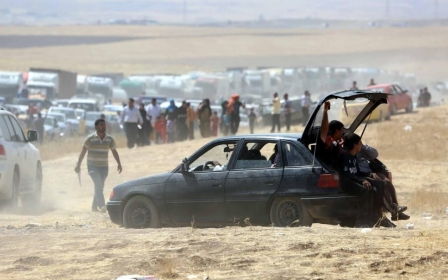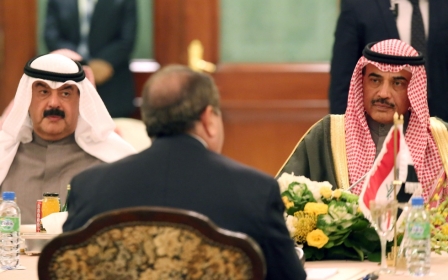Iraq becomes a victory for Bin Laden

Osama Bin Laden’s goal in the September 11, 2001 attacks was to suck the US into Afghanistan and Iraq, sparking a regional conflagration that would sweep away the imperial legacy. Over a decade later, this plan is still on track. As he led his jihadists triumphantly into Mosul and declared an emirate on Iraq-Syrian territory, Islamic State (IS) leader Abu Bakr al-Baghdadi announced that the 1916 secret Sykes-Picot Agreement between Britain, France and imperial Russia was at last being dismantled.
The US and Saudis now face an intractable dilemma.
· For the US, allowing the local al-Qaeda rebels to consolidate their hold on Sunni Iraq and northern Syria means the complete failure of their post-9/11 strategy of creating a new Middle East under their hegemony.
· For the Saudis, it means risking the very existence of the Saudi state itself.
Sykes-Picot and Saudi Arabia
All of the Middle East states, including Saudi Arabia, were founded as a result of the disintegration of the Ottoman Caliphate at the end of World War I and Sykes-Picot that effectively abolished the Ottoman Caliphate (Turkey’s new secular leader formalised this in 1924), dividing it into British-French “mandates” and eventually nation states. The prickly Saudis did not suffer the humiliation of direct occupation, but they followed the imperial agenda.
Saudi control of the Arabian Peninsula was not what the British had in mind. The British had hoped that the Hashemites could consolidate power over the holy cities Mecca and Medina. They nominally ruled Mecca at the time and in 1917 Hussein the Emir of Mecca was internationally recognised as king of the Kingdom of Hejaz. But when the Saud tribe occupied Mecca in 1924, the British acceded to this fait accompli and even helped the Sauds quell their dissident Ikhwan religious fanatics (not to be confused with the Egyptian Muslim Brotherhood founded in 1928).
These Ikhwan, were organised by Saud tribal chief Abdul Aziz in 1912 as an elite army corps, and helped the Sauds against the Hashemites and the British. However, they were then betrayed by the Sauds and their new patrons—yes, the very same British—in 1929. The Ikhwan were not happy with the Sykes-Picot Agreement, which the Sauds accepted, allowing them to establish a tribal monarchy in alliance with the imperialists to govern the Muslim world, and regarded the western modernisation pursued by Abdul Aziz as a betrayal of the fundamentals of Islam.
The Sauds, and even more so the Ikhwan, could be seen as the IS of the day. Both were ruthless fighters who slaughter their enemies as ‘unbelievers’, determined to impose their Wahhab-inspired austere Islam on all Muslims. The Sauds were known for their thorough plundering and merciless killings, their raids being “deadlier than traditional Bedouin raids, which usually avoided killing for fear of triggering a blood feud,” according to historian Vernon Egger.
For almost a century now, the Sauds have been able to square the circle, reconciling their role within the empire with their Wahhab-style Islam. But they have had their day. Al-Qaeda and now IS find their inspiration not with the compromised Saudis but the Ikhwan rebels.
Just as the first Saudi King Abdul Aziz, supported by the Ikhwan, swept away the more complacent Hashemites and Ottomans/ British – the modern day Bin Laden/ IS assault will sweep away the now complacent Saudi royal family, grown fat on its oil wealth, and its US sponsors. Saudi control of the holy cities provides a poor echo of the once powerful Islamic civilisation, and the “neo-Wahhabis” know it.
A rump caliphate
The yearning for a revival of the caliphate is predominantly a Sunni one. Hizb ut-Tahrir (HuT, Party of Liberation) was founded by Palestinians and Jordanians in 1953, advocating the revival of the Ottoman Caliphate. It was/is supported by Saudi Arabia (though it does not openly operate in Saudi Arabia).
The whole nineteenth century reform thrust in Islam appeared to be Sunni, though renowned Islam ideologist and Pan-Arabist Jamal al-Din al-Afghani was himself Shiite, and his Sunni Egyptian ally Muhammad Abduh was nonsectarian, campaigning for an end to Sunni-Shiite animosity. After the Caliphate was abolished in 1924 and replaced by colonialism, Shiite and Sunnis cooperated in the revivalist Khilafat Movement. Iraqi Shiite legal and religious scholars (ulama) supported the Sunni rebellion against the British, and Persian religious scholars went to the Caliphate Conference in Jerusalem in 1931.
Sunni extremists like IS accuse Shiites of being American agents, supporting the US in Iraq and Afghanistan. This is hardly fair. Shiite parties opposed these invasions, but really had no alternative, and accepted the occupations as faits accomplis, naturally attempting to improve their lot under the circumstances. The charge of being agents of imperialism is belied by the fact that Iran is the only outspoken Islamic critic of imperialism and is the subject of unrelenting subversion for its trouble.
However, the imperial strategy of divide and conquer has worked, and Sunni-Shiite sectarianism has been consolidated to the extent that to achieve their goal of a new caliphate, IS is collaborating with their secular foes of yesteryear, Baathists and former military personnel, who operate as the Iraqi Islamic Army and the 1920 Revolution Brigades.
Such a strategy will achieve at best, a truncated caliphate - roughly IS’s current territory - surrounded by hostile Sunni and Shiite states. This temporary solution will soon see further conflict as the ex-Baathists struggle for control. Their tactical alliance with IS can’t last. At that point, ISIL will be forced to look to their Saudi foes for support, but this again is not a stable alliance, as the Saudi betrayal of the Ikhwan in the 1920s reminds us.
This caliphate revival, the goal of Bin Laden, of HuT, and stretching back to the Ikhwan in the 1920s and Afghanistan in the nineteenth century, should have ended with the US invasions following 9/11, which aimed at destroying al-Qaeda and consolidating US hegemony in the region. However, the US invasions of Afghanistan and Iraq proved to be a boon to these “neo-Wahhabis”, and all Obama’s horses and all of his men now look quite helpless.
By backing the Syrian insurgency, the US gave at least free rein (if not actual support) to IS, who presumably were only supposed to be spoilers, weaken Assad, possibly split up Syria and Iraq, but certainly not to gain power and keep it. With that now a possibility, the US is panicking, as it should. So far, the Saudis aren’t panicking, presumably counting on using their oil wealth and anti-Shiite sectarianism to let them co-opt leaders of some future Sunni Iraqi-Syrian state.
Perhaps they count on the US to drone IS out of existence and replace them with pro-US Sunnis. But this no longer looks like an option either. ISIL types are prepared to die in their jihad, like the Ikhwan insurgents a century ago, and it is unlikely that ISIL will be seduced by either the empire or a bankrupt monarchy.
Acceding to a rump caliphate would be the equivalent of the British making peace in the 1920s with the Ikhwan, an impossibility in terms of empire strategy. Now, as then, Saudi hegemony must be preserved. Now, as then, Saudi collapse would mean an end to imperial control over the vital region.
- Eric Walberg is a Canadian journalist specialising in the Middle East, Central Asia and Russia. He is an economics expert who has written widely on East-West relations since the 1980s. Eric has previously worked as a UN advisor and currently writes for PressTV and al-Ahram. He is the author of Postmodern Imperialism: Geopolitics and the Great Games and From Postmodernism to Postsecularism: Re-emerging Islamic Civilization.
The views expressed in this article belong to the author and do not necessarily reflect the editorial policy of Middle East Eye.
Photo Credit: The Islamic State fighters declared their own Caliphate on Sunday (AFP)
New MEE newsletter: Jerusalem Dispatch
Sign up to get the latest insights and analysis on Israel-Palestine, alongside Turkey Unpacked and other MEE newsletters
Middle East Eye delivers independent and unrivalled coverage and analysis of the Middle East, North Africa and beyond. To learn more about republishing this content and the associated fees, please fill out this form. More about MEE can be found here.





